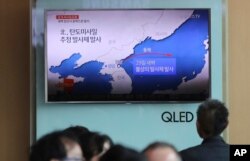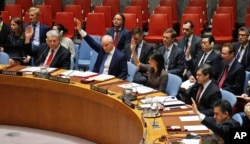U.S. Secretary of Defense James Mattis applauded China’s efforts to work with the international community on North Korea at an annual security forum in Singapore Saturday. But when it came to the South China Sea, he called China’s ongoing militarization of man-made islands there and its disregard for international order, unacceptable.
“We cannot accept Chinese actions that impinge on the interests of the international community, undermining the rules-based order that has benefited all countries here today (at the forum), including, and especially China,” Mattis said, in a speech to delegates and the media at the Shangri-La Dialogue.
Watch: US Security Policy in Spotlight at Annual Asia Defense Summit
He said that while competition between the world’s two largest economies was bound to occur, conflict is not inevitable.
“Artificial island construction and indisputable militarization of facilities on features in international waters undermines regional stability,” he said, noting that China’s military buildup of the man-made beachheads differed from what other countries had done.
Beijing’s approach is different not only in terms of the nature of weaponization on the artificial islands, Mattis said, but for “China’s disregard for international law, it’s contempt for other nation’s interests and its efforts to dismiss nonadversarial resolution of issues.”
Lieutenant General He Lei, vice president of the Chinese Academy of Military Science and head of China’s delegation at the meetings, flatly rejected Mattis’ accusations. He said China has signed more than 23,000 bilateral agreements and 400 multilateral agreements, and that it is a participant in all of the United Nations’ specialized committees.
“China is a supporter and defender of international and regional rules and regulations,” he said. “But when it comes to defining international rules, that should be based on what the majority of countries agree on and what represents the interests of the majority.”
The same goes for regional rules and regulations, he added, noting China’s recent progress along with the Association of Southeast Asian Nations in drafting a framework for a code of conduct for the South China Sea.
He also highlighted that China participated in the formulation of United Nations Convention of the Law of the Sea. Beijing ratified the convention in 1996.
North Korea a priority
Since coming to office, President Donald Trump has made North Korea a top priority, and in his speech, Mattis echoed concerns the administration has about the clear and present danger the North poses to the region and beyond.
“Coupled with reckless proclamations, the current North Korean program signals a clear intent to acquire nuclear-armed ballistic missiles, including those of intercontinental range, that pose direct and immediate threats to our regional allies, our partners, and all the world,” he said.
His tough remarks dispelled speculation that the administration was keeping quiet about the South China Sea in exchange for China’s cooperation in dealing with Pyongyang. Mattis said the interests of the United States allies would not be used as bargaining chips.
New sanctions, new diplomacy
Without elaborating, the defense secretary said countries are working on new, enhanced sanctions and diplomatic efforts to put more pressure on North Korea. In addition to words and support, however, he said action was needed as well — from all parties.
“The Trump administration is encouraged by China’s renewed commitment to work with the international community toward denuclearization,” he said. “Ultimately we believe that China will come to recognize North Korea as a strategic liability and not an asset. A liability inciting increased disharmony and causing peace-loving populations in the region to increase defense spending.”
While relations between Pyongyang and Beijing have grown increasingly frayed in recent years under the administration of Kim Jong-Un, China is still North Korea’s biggest ally and supporter. Some analysts argue that Beijing does not want the issue to be resolved because of the possibility that it could lead to a unified Korea and put the United States right on its northeastern doorstep.
But Kim Jung Un’s persistent threats and missile tests are wearing down support for North Korea in China. And calls for a tougher response from Beijing are growing at home.








